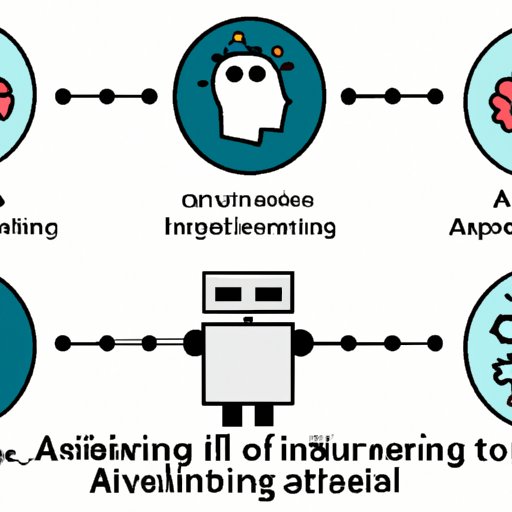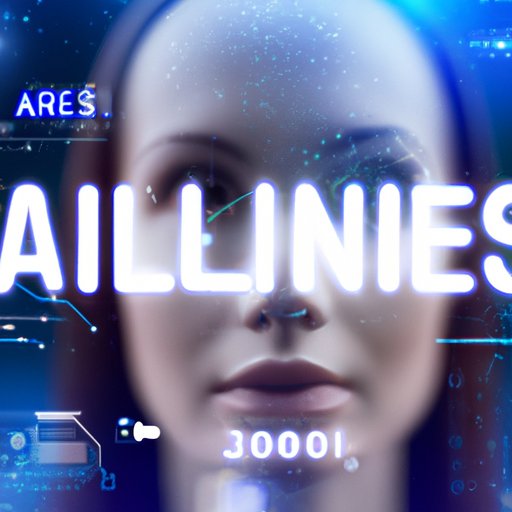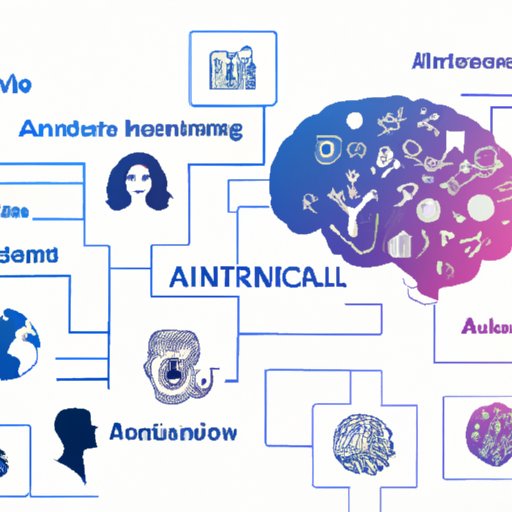Introduction
Artificial Intelligence (AI) has become an increasingly important part of our lives over the past few years, from self-driving cars to voice-activated virtual assistants. But what is AI? And how does it work? In this article, we’ll explore the definition of AI and examine its applications, benefits, and challenges, as well as its potential implications for society. We’ll also look at AI in everyday life, and consider the ethical issues surrounding AI technologies.

An Overview of Artificial Intelligence: Exploring What AI Is and How It Works
Before we dive into the specifics of AI, let’s start by defining what it is. AI is a branch of computer science that focuses on creating intelligent machines that are capable of performing tasks that normally require human intelligence. This can include recognizing speech, understanding natural language, making decisions, and solving complex problems.
AI is composed of two parts: algorithms and data. Algorithms are sets of instructions that tell the machine how to process data, while data is the information used by the machine to learn and make decisions. By combining these two elements, AI systems are able to learn from experience and improve their performance over time.
There are several different types of AI, including machine learning, deep learning, and natural language processing. Machine learning is a type of AI that uses algorithms to identify patterns in data and make predictions about future outcomes. Deep learning is a subset of machine learning that uses neural networks to learn from large amounts of data. Natural language processing is a type of AI that enables computers to understand and process human language.
AI can be applied to a wide range of tasks and industries, such as healthcare, finance, retail, transportation, and more. AI can be used to automate mundane tasks, such as sorting data or analyzing customer feedback, as well as more complex tasks, such as diagnosing diseases or predicting stock prices.
The Benefits and Challenges of AI: Understanding the Impact of AI on Society
AI has the potential to greatly improve our lives, but there are also some potential drawbacks. Let’s take a look at the benefits and challenges of AI.
One of the most significant benefits of AI is that it can help increase efficiency and reduce costs. By automating mundane tasks and using predictive analytics, businesses can save time and money, while still providing high-quality services and products.
Another benefit of AI is that it can be used to detect and respond to threats faster than humans. AI can be used to monitor security systems, detect cyberattacks, and respond quickly to prevent further damage.
However, there are also some potential challenges associated with AI. One of the biggest concerns is privacy. As AI systems become more powerful, they may be able to access and store large amounts of personal data, which could lead to violations of user privacy.
Another challenge is job displacement. As AI systems become more capable, they could potentially replace certain jobs, leading to unemployment and economic instability.

AI in Everyday Life: Examining the Uses of AI in Business and Consumer Applications
AI is becoming increasingly common in both business and consumer applications. In the business world, AI can be used to streamline processes, automate tasks, and provide insights into customer behavior. For example, AI can be used to analyze customer data and generate personalized recommendations, or to automate customer service requests.
In the consumer world, AI is becoming increasingly prevalent in devices like smartphones and smart home appliances. AI can be used to recognize voice commands, suggest music or movies based on user preferences, or even provide real-time translation services.
The Future of AI: Exploring the Possibilities for AI Technologies and Their Impact
As AI technologies continue to evolve, the possibilities for their use are almost limitless. AI could be used to create autonomous vehicles, enable smarter cities, or even detect disease before it manifests. However, there are also some potential risks to consider.
One possible risk is that AI could be used to manipulate people or influence their decisions. AI systems could be used to target ads or content to users in order to sway their opinion or behavior. Additionally, AI could be used to track people’s movements or access their private data without their knowledge.

Ethical Issues Surrounding AI: Considering the Implications of AI on Human Rights and Society
As AI becomes more widely used, it’s important to consider the ethical implications of this technology. AI systems must be designed with fairness and respect for human rights in mind. For example, AI systems must not discriminate against certain groups of people or be used to violate human rights.
It’s also important to consider the social implications of AI. AI systems should be designed to enhance society, rather than replace human interaction or decision-making. Additionally, AI systems should be designed to be transparent and accountable, so that users know how and why decisions are being made.
Conclusion
In conclusion, Artificial Intelligence (AI) is a rapidly developing field of computer science that has the potential to revolutionize many aspects of our lives. AI can be used to automate mundane tasks, detect and respond to threats, and provide insights into customer behavior. However, it is important to consider the potential risks of AI, such as job displacement and privacy violations, as well as the ethical implications of this technology. As AI continues to evolve, it will be important to keep these issues in mind in order to ensure that AI is used responsibly and ethically.
(Note: Is this article not meeting your expectations? Do you have knowledge or insights to share? Unlock new opportunities and expand your reach by joining our authors team. Click Registration to join us and share your expertise with our readers.)
